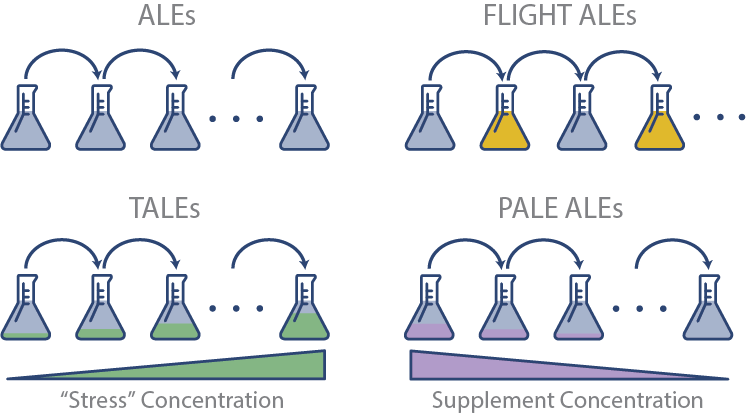Adaptive Laboratory Evolution
The Adaptive Laboratory Evolution (ALE) Group harnesses the power of biology to self-optimize under selective pressures and apply this concept to obtain strains with useful industrial and applied phenotypes.
With the rise of laboratory automation, whole-genome sequencing, and bioinformatics, we have built a powerful, comprehensive platform that allows us to progress from a selectable feature or concept to a fully characterized strain with desirable traits and a defined, interpreted genotype.
The major features of our platform include:
- Robotics and Automation: Hardware with several "ALEbots" in operation with different capabilities, Process Control Software, Suites of Modules for different Section Pressures, Algorithms to optimize start up and termination criteria.
- Bioinformatics: Mutation database for rapid dissemination and interpretation, Standardized mutation calling pipeline with multiple mutation callers and quality control.
- Experience and Knowhow: Several successful use cases and applications, Standard Operating Procedures (SOPs) followed for various experiments, Over 75 peer-reviewed publications demonstrating the utility of ALE for solving problems in industrial biotechnology.
The goal of the ALE Group is to utilize laboratory evolution during the build and test phases of the strain construction process, as well as to uncover key unknowns in relevant microbial species. This approach allows for the efficient discovery and creation of what is not possible with other methods.
Selected Publications
- Sandberg TE, Salazar MJ, Weng LL, Palsson BO, Feist AM “The emergence of adaptive laboratory evolution as an efficient tool for biological discovery and industrial biotechnology.” Metab Eng. 2019 Aug 8. pii: S1096-7176(19)30153-3. doi: 10.1016/j.ymben.2019.08.004.
- Lennen RM, Lim HG, Jensen K, Mohammed ET, Phaneuf PV, Noh MH, Malla S, Börner RA, Chekina K, Özdemir E, Bonde I, Koza A, Maury J, Pedersen LE, Schöning LY, Sonnenschein N, Palsson BO, Nielsen AT, Sommer MOA, Herrgård MJ, Feist AM. Laboratory evolution reveals general and specific tolerance mechanisms for commodity chemicals. Metab Eng. 2023 Mar;76:179-192. doi: 10.1016/j.ymben.2023.01.012. Epub 2023 Feb 3. PMID: 36738854
- Radi MS, SalcedoSora JE, Kim SH, Sudarsan S, Sastry AV, Kell DB, Herrgård MJ, Feist AM. Membrane transporter identification and modulation via adaptive laboratory evolution. Metab Eng. 2022 Jul;72:376-390. doi: 10.1016/j.ymben.2022.05.004.
- Phaneuf PV, Zielinski DC, Yurkovich JT, Johnsen J, Szubin R, Yang L, Kim SH, Schulz S, Wu M, Dalldorf C, Ozdemir E, Lennen RM, Palsson BO, Feist AM. Escherichia coli Data-Driven Strain Design Using Aggregated Adaptive Laboratory Evolution Mutational Data. ACS Synth Biol. 2021 Dec 17;10(12):3379-3395. doi: 10.1021/acssynbio.1c00337. Epub 2021 Nov 11. PMID: 34762392
- Guzmán GI, Sandberg TE, LaCroix RA, Nyerges A, Papp H, de Raad M, King ZA, Hefner Y, Northen TR, Notebaart RA, Pál C, Palsson BO, Papp B, Feist AM “Enzyme promiscuity shapes adaptation to novel growth substrates” Mol Syst Biol. 2019 15: e8462 doi: 10.15252/msb.20188462
More info: Feist Lab
Software / Databases: ALEdb

Contact
Adam Feist Senior Scientist afeist@biosustain.dtu.dk